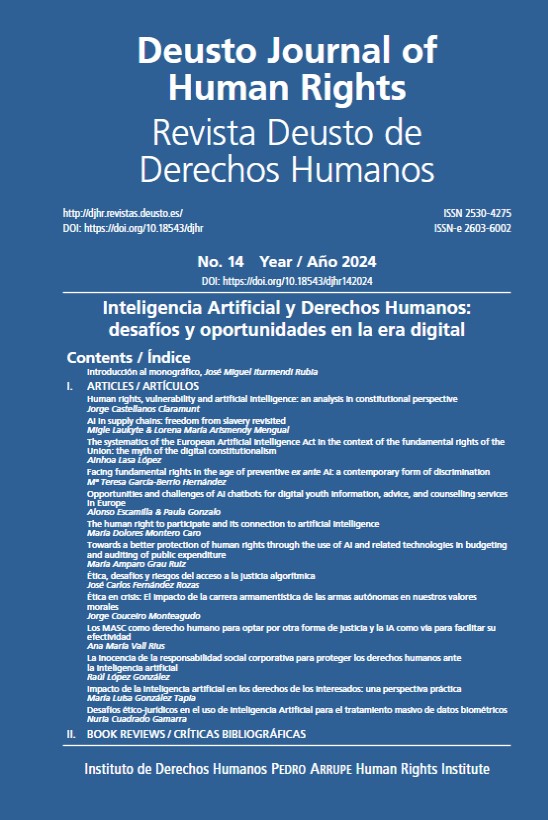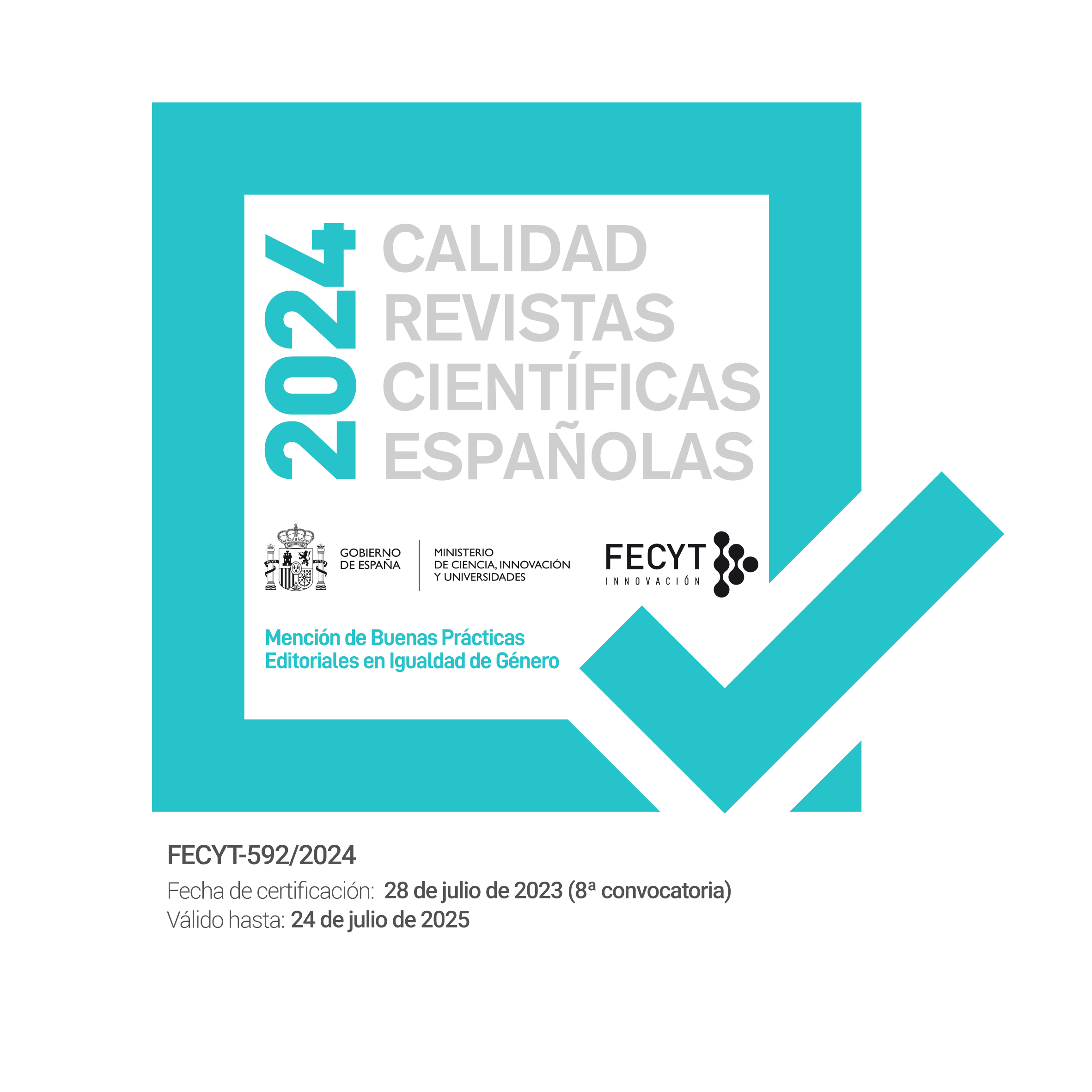Hacia una mejor protección de los derechos humanos mediante el uso de la IA y tecnologías conexas en la presupuestación y control del gasto público
Resumen
El pleno potencial de muchos derechos humanos no puede alcanzarse debido a los costes económicos que conlleva su desarrollo. El uso de inteligencia artificial y tecnologías conexas en los procesos presupuestarios y de auditoría podría ayudar a una mejor asignación de los escasos recursos públicos y suponer ahorros por una mejor orientación en la programación y ejecución, evitando irregularidades y corrupción. Cuando las organizaciones públicas y empresariales automatizan procesos, la supervisión debe garantizar su conformidad con la normativa o los compromisos voluntarios que afectan a criterios medioambientales, sociales y de gobernanza. Muchos fondos se conceden para apoyar procesos de digitalización si se respetan las salvaguardias relacionadas con los derechos humanos. La provisión de bienes y servicios como la sanidad y la educación está sujeta, a menudo, a requisitos tecnológicos adicionales. En ambos casos, un control eficaz es crucial para la equidad, en términos de accesibilidad y protección efectiva de los derechos humanos.
Recibido: 08 septiembre 2024
Aceptado: 10 diciembre 2024
Descargas
Citas
Berryhill, Jamie, Kevin K. Heang, Rob Clogher & Keegan McBride. 2019. «Hello, world: Artificial Intelligence and its use in the public sector.» OECD Working Papers on Public Governance 36. https://doi.org/10.1787/726fd39d-en.
Collovà, Claudio, Velina Lilyanova & Nele Lüker. 2024. «Digital public services in the National Recovery and Resilience Plans. Mid-term multilevel governance appraisal.» Briefing European Parliamentary Research Service PE 762.287.
European Parliament. 2024. «Briefing for the FEMM delegation to UN CSW 68 (18-22 March 2024).» Briefing Directorate-General for Internal Policies PE 760.544.
European Parliament. 2021. Proceedings of the workshop on «Use of big data and AI in fighting corruption and misuse of public funds - good practice, ways forward and how to integrate new technology into contemporary control framework.» Directorate General for Internal Policies of the Union. PE 691.722.
Fedeli, Mark. 2024. «Power through fiscal year-end budgeting with AI, workflow automation.» Accessed May 22, 2024. https://www.federaltimes.com/opinions/2024/04/22/power-through-fiscal-year-end-budgeting-with-ai-workflow-automation/#:~:text=More%20federal%20agencies%20are%20harnessing,traceability%20of%20data%20across%20programs.
Fernández-Cortez, Vanessa, David Valle-Cruz & José Ramón Gil-García. 2020. «Can Artificial Intelligence help optimize the public budgeting process? Lessons about smartness and public value from the Mexican Federal Government.» IEEE Xplore 978-1-7281-5882-2/20.
Grau, Mª Amparo. 2023. «La utilización de la inteligencia artificial en la función de control.» Revista Española de Control Externo 74-75: 72-91.
Grau, Mª Amparo. 2022a. «Fiscal transformations due to AI and robotization: where do recent changes in tax administrations, procedures and legal systems lead us?». Northwestern Journal of Technology and Intellectual Property 19: 325-363. Accessed: May 24, 2024. https://scholarlycommons.law.northwestern.edu/njtip/vol19/iss4/1.
Grau, Mª Amparo. 2022b «The Alignment of Taxation and Sustainability: Might the Digital Controls of Non-Financial Information Become a Universal Panacea?» Review of European & Comparative Law 3: 61.
Grau, Mª Amparo. 2020 «Los Derechos Humanos en el siglo XXI: ¿Cómo financiar su coste para salvaguardar su efiacia?» In Los Derechos Humanos en el siglo XXI, Tomo III: Los Derechos Humanos desde la perspectiva política y social, edited by José Antonio Pinto and Ángel Sánchez de la Torre, 175-180. Madrid: Edisofer.
Johnston, Liz. 2023a. «What State and Local Governments Should Look for in a Cloud Budgeting Software Solution.» January 19. Accessed: May 24, 2024. https://www.resourcex.net/blog/what-state-and-local-governments-should-look-for-in-a-cloud-budgeting-software-solution.
Johnston, Liz. 2023b. «GFOA Budgeting Best Practices for State and Local Governments.» February 16. Accessed: May 24, 2024. https://www.resourcex.net/blog/gfoa-budgeting-best-practices-for-state-and-local-governments.
Johnston, Liz. 2023c. Step-by-Step Guide to the Public Sector Budgeting Process. April 27. Accessed: May 24, 2024. https://www.resourcex.net/blog/step-by-step-guide-to-the-public-sector-budgeting-process.
Johnston, Liz 2022b. «What Is Government Budgeting Software? 3 Basics to Know.» September 8. Accessed: May 24, 2024. https://www.resourcex.net/blog/government-budgeting-software-3-basics-to-know.
Lilyanova, Velina. 2024. «Investment in artificial intelligence in the National Recovery and Resilience Plans.» Briefing European Parliamentary Research Service. PE 762.288.
Maciejewski, Mariusz. 2024. «Law and ICT, Policy Department for Citizens’ Rights and Constitutional Affairs.» Directorate-General for Internal Policies. PE 762.738.
Mahmutaj, Klentiana. Forthcoming. «Artificial Intelligence, Regulation, and the Right to Development.» Thematic study by the Expert Mechanism on the Right to Development. Accessed: May 24, 2024. https://www.ohchr.org/en/documents/ongoing-studies/artificial-intelligence-regulation-and-right-development-thematic-study.
Malan, Jack and Marta Dimauro. 2022. «Single Audit Approach - Root Causes of the Weaknesses in the Work of the Member States’ Managing and Audit Authorities.» European Parliament STUDY. PE 732.267.
Martín López, Jorge. 2023. Inteligencia artificial y comprobación tributaria: transparencia y no discriminación, Pamplona: Aranzadi.
Navarra, Cecilia, Aleksandra Heflich and Meenaakshi Fernandes. 2024. «Improving EU action to end poverty in developing countries. Cost of non- Europe report.» European Parliament STUDY. PE 747.425.
Preut, Anna, Jan-Philip Kopka and Uwe Clausen. 2021. «Digital twins for the circular economy.» Sustainability 13 (18): 10467. https://doi.org/10.3390/su131810467.
Rampton, James et al. 2024. «The future of digitalisation in budgetary control.» Directorate-General for Internal Policies. PE 759.623.
Resource X. 2023. «Artificial Intelligence for budgeting: maximizing resources with AI modeling.» November 14. Accessed: July 12, 2024. https://www.resourcex.net/blog/artificial-intelligence-for-budgeting-maximizing-resources-with-ai-modeling.
United Nations. 2022. Revolutionizing public financial management with cutting-edge AI-powered tools. Accessed: may 13, 2024. https://www.unescwa.org/AI-budgeting.
United Nations. 2023. «Financing for development gateway: Financing is about transforming lives not just economies.». Accessed: August 21, 2024. https://www.unescwa.org/sites/default/files/inline-files/23-00158-Financing-for-Development-Gateway-Web.pdf.
Valle-Cruz, David, Vanessa Fernández-Cortez and Ramón Gil-García. 2022. «From e-budgeting to smart budgeting: Exploring the potential of artificial intelligence in government decision-making for resource allocation.» Government Information Quarterly 39: 101644.
Deusto Journal of Human Rights / Revista Deusto de Derechos Humanos es una revista de Acceso Abierto; lo que significa que es de libre acceso en su integridad inmediatamente después de la publicación de cada número. Se permite su lectura, la búsqueda, descarga, distribución y reutilización en cualquier tipo de soporte sólo para fines no comerciales y según lo previsto por la ley; sin la previa autorización de la Editorial (Universidad de Deusto) o la persona autora, siempre que la obra original sea debidamente citada (número, año, páginas y DOI si procede) y cualquier cambio en el original esté claramente indicado. Cualquier otro uso de su contenido en cualquier medio o formato, ahora conocido o desarrollado en el futuro, requiere el permiso previo por escrito de la persona titular de los derechos de autoría.



3.jpg)
3.jpg)
3.jpg)
.jpg)








